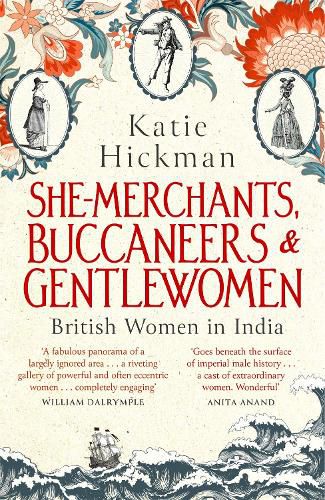Readings Newsletter
Become a Readings Member to make your shopping experience even easier.
Sign in or sign up for free!
You’re not far away from qualifying for FREE standard shipping within Australia
You’ve qualified for FREE standard shipping within Australia
The cart is loading…






‘Sharply observed, snappily written and thoroughly researched, SHE MERCHANTS provides a fabulous panorama of a largely ignored area of social history. Katie Hickman successfully challenges the stereotype of the snobbish, matron-like memsahib by deploying a riveting gallery of powerful and often eccentric women ranging from stowaways and runaways through courtesans and society beauties to Generals’ feisty wives and Viceroys’ waspish sisters. It is full of surprises and new material and completely engaging from beginning to end’ William Dalrymple
The first British women to set foot in India did so in the very early seventeenth century, two and a half centuries before the Raj.
Women made their way to India for exactly the same reasons men did - to carve out a better life for themselves. In the early days, India was a place where the slates of ‘blotted pedigrees’ were wiped clean; bankrupts given a chance to make good; a taste for adventure satisfied - for women. They went and worked as milliners, bakers, dress-makers, actresses, portrait painters, maids, shop-keepers, governesses, teachers, boarding house proprietors, midwives, nurses, missionaries, doctors, geologists, plant-collectors, writers, travellers, and - most surprising of all - traders.
As wives, courtesans and she-merchants, these tough adventuring women were every bit as intrepid as their men, the buccaneering sea captains and traders in whose wake they followed; their voyages to India were extraordinarily daring leaps into the unknown.
The history of the British in India has cast a long shadow over these women; Memsahibs, once a word of respect, is now more likely to be a byword for snobbery and even racism. And it is true: prejudice of every kind - racial, social, imperial, religious - did cloud many aspects of British involvement in India. But was not invariably the case.
In this landmark book, celebrated chronicler, Katie Hickman, uncovers stories, until now hidden from history: here is Charlotte Barry, who in 1783 left London a high-class courtesan and arrived in India as Mrs William Hickey, a married ‘lady’; Poll Puff who sold her apple puffs for ‘upwards of thirty years, growing grey in the service’; Mrs Hudson who in 1617 was refused as a trader in indigo by the East Indian Company, and instead turned a fine penny in cloth; Julia Inglis, a survivor of the siege of Lucknow; Amelia Horne, who witnessed the death of her entire family during the Cawnpore massacres of 1857; and Flora Annie Steel, novelist and a pioneer in the struggle to bring education to purdah women.
For some it was painful exile, but for many it was exhilarating. Through diaries, letters and memoirs (many still in manuscript form), this exciting book
$9.00 standard shipping within Australia
FREE standard shipping within Australia for orders over $100.00
Express & International shipping calculated at checkout
‘Sharply observed, snappily written and thoroughly researched, SHE MERCHANTS provides a fabulous panorama of a largely ignored area of social history. Katie Hickman successfully challenges the stereotype of the snobbish, matron-like memsahib by deploying a riveting gallery of powerful and often eccentric women ranging from stowaways and runaways through courtesans and society beauties to Generals’ feisty wives and Viceroys’ waspish sisters. It is full of surprises and new material and completely engaging from beginning to end’ William Dalrymple
The first British women to set foot in India did so in the very early seventeenth century, two and a half centuries before the Raj.
Women made their way to India for exactly the same reasons men did - to carve out a better life for themselves. In the early days, India was a place where the slates of ‘blotted pedigrees’ were wiped clean; bankrupts given a chance to make good; a taste for adventure satisfied - for women. They went and worked as milliners, bakers, dress-makers, actresses, portrait painters, maids, shop-keepers, governesses, teachers, boarding house proprietors, midwives, nurses, missionaries, doctors, geologists, plant-collectors, writers, travellers, and - most surprising of all - traders.
As wives, courtesans and she-merchants, these tough adventuring women were every bit as intrepid as their men, the buccaneering sea captains and traders in whose wake they followed; their voyages to India were extraordinarily daring leaps into the unknown.
The history of the British in India has cast a long shadow over these women; Memsahibs, once a word of respect, is now more likely to be a byword for snobbery and even racism. And it is true: prejudice of every kind - racial, social, imperial, religious - did cloud many aspects of British involvement in India. But was not invariably the case.
In this landmark book, celebrated chronicler, Katie Hickman, uncovers stories, until now hidden from history: here is Charlotte Barry, who in 1783 left London a high-class courtesan and arrived in India as Mrs William Hickey, a married ‘lady’; Poll Puff who sold her apple puffs for ‘upwards of thirty years, growing grey in the service’; Mrs Hudson who in 1617 was refused as a trader in indigo by the East Indian Company, and instead turned a fine penny in cloth; Julia Inglis, a survivor of the siege of Lucknow; Amelia Horne, who witnessed the death of her entire family during the Cawnpore massacres of 1857; and Flora Annie Steel, novelist and a pioneer in the struggle to bring education to purdah women.
For some it was painful exile, but for many it was exhilarating. Through diaries, letters and memoirs (many still in manuscript form), this exciting book